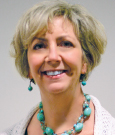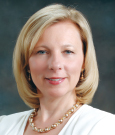S. Gail Eckhardt, MD, FASCO, is a tenured Professor at the University of Colorado School of Medicine, where she also holds the Stapp Harlow Chair in Cancer Research. She has been a faculty member at the institution since 1999 and was Division Head of Medical Oncology from 2006–2014. Currently, she serves as the Associate Director for Translational Research at the University of Colorado Comprehensive Cancer Center and Director of the Phase I Program and Fellowship.
An ASCO member since 1994, Dr. Eckhardt has served most recently on the New Drugs in Oncology Seminar Planning Committee (2013–2014), the ASCO Connection Editorial Board (2008–2013), and the ASCO-American Association for Cancer Research (AACR) Methods in Clinical Cancer Research Workshop Program Committee (2005–2012). She has served on the ASCO Board of Directors, was Co-Chair of the Molecular Oncology Task Force, and Chair of the Gastrointestinal Cancers Symposium Steering Committee, among other positions. She served as Course Director for the ASCO-AACR Methods in Clinical Cancer Research Workshop for 4 years, and in 2014 and 2015 she was awarded the Merrill J. Egorin Outstanding Mentor of the Year Award.
Bruce E. Johnson, MD, FASCO, is Chief Clinical Research Officer and Institute Physician at the Dana-Farber Cancer Institute and Professor of Medicine at Harvard Medical School. He is Director of the Dana-Farber/Harvard Cancer Center (DF/HCC) Lung Cancer Program, and Principal Investigator of the DF/HCC Lung Cancer Specialized Program of Research Excellence (SPORE). He recently stepped down as the Director of the Lowe Center for Thoracic Oncology, a position he held beginning in 1998.
An ASCO member since 1985, Dr. Johnson is currently a member of the Bylaws Committee. He has served in numerous volunteer and leadership roles, including the Board of Directors (2008–2011); Chair of the Audit, Cancer Education, and Cancer Communications Committees; and on the Journal of Clinical Oncology Editorial Board, among other positions. In 2008, he was awarded the Translational Research Professorship from the Conquer Cancer Foundation of ASCO.
Robin T. Zon, MD, FACP, FASCO, is Vice President/Partner, Medical Oncology, at Michiana Hematology-Oncology, PC, as well as Quality Care Assurance/Compliance Liaison Officer and Chair of the practice’s Quality and Finance Committees. She has been at Michiana Hematology-Oncology, PC since 1998.
Since joining ASCO in 1997, Dr. Zon has held numerous leadership and volunteer positions within the Society. She has served on the Board of Directors (2010–2013), and is currently Immediate Past Chair of the Clinical Practice Committee (Chair, 2014–2015). She is a current member of the CEO Search Advisory Committee; CancerLinQTM Data Governance Oversight Committee; Chair of the Pathways Task Force; and recently completed her terms with thePractice Guidelines Implementation Network, Breast Cancer Consensus Panel, and International Clinical Trial Workshop Committee. Her practice has received ASCO’s Clinical Trials Participation Award twice, in 2008 and 2014, and was Quality Oncology Practice Initiative (QOPI®) certified in 2010 and recertified in 2013.
Why do you want to serve as ASCO President?
Dr. Eckhardt: I served on the ASCO Board of Directors from 2004–2007 and, like many Board members, was struck by the breadth and depth of ASCO’s involvement, engagement, and leadership in the global oncology community. When I rotated off the Board of Directors, I was nominated for ASCO President, but my sons were still at home and I was very committed to maximizing the time I had left with them. Interestingly, I think that ASCO has grown and matured during the past 8 years into a distinctly different, more interventional organization, which really appeals to me. For example, the Quality Oncology Practice Initiative (QOPI®), Targeted Agent and Profiling Utilization Registry (TAPUR), and CancerLinQTM represent just a small subset of initiatives that ASCO is leading that represent tangible, interventional advances that will have real impact on physicians and patients. Thus, becoming ASCO President provides an unparalleled opportunity to be part of a collaborative effort to shape global cancer research and care and greatly impact patients.
Dr. Johnson: I consider service as a prospective ASCO President a fulfillment of my most significant professional and academic career goal. ASCO is the leading organization of oncology professionals in the world, and I would be honored and proud to serve as its volunteer leader. Previous presidents have set high marks guiding our association, and it would be a privilege to join their ranks as a leader of our Society. I believe that my established experience in translational research can help make an impact for our members, our Society, and our patients. In addition, the extraordinary volunteers, management, and professional staff of ASCO make guiding the organization particularly appealing.
My goals as a potential ASCO President include playing a part in formulating the strategic directions of our professional society; anticipating and responding to evolving heath-care policies; using big data to guide treatment of our patients; and helping provide the necessary tools for our members to adapt to the professional and financial aspects of oncology practice. My service on ASCO committees and the Board of Directors has prompted me to seek the position of ASCO President and continue to have an impact on the future direction of clinical oncology professionals and our patients.
Dr. Zon: These are the most challenging times that oncology providers, and ASCO as the leading professional oncology society, have ever encountered. The face of oncology care is constantly changing due to scientific and technologic advances and practice environment requirements. In a number of cases these changes have threatened the viability of the cancer care delivery model. During this time of volatility, our members need the continued attention of ASCO leadership and services to support our ability to deliver high-quality, high-value, and evidence-based care for patients worldwide.
I would be honored to serve as your President during these transformative times, capitalizing on my background as a community oncologist, clinical investigator, and business owner. I would work to empower our members by closely collaborating with the Board of Directors, organizational leaders, volunteers, staff, patient advocates, and government agencies. I believe we must change together with a tour de force. Our success will rely on integrating our Society’s diverse strengths, sharing successful strategies, and developing practical resources and solutions. As President, I would pledge to dedicate myself to the mission of ASCO, address the needs of our membership and patients, and value our diversity as our strength.
What do you see as the future of ASCO and the field of cancer research and care in the next 5 and 10 years? What is the most important role for the Society in shaping the global oncology community within the next 10 years?
Dr. Eckhardt: I think that over the next 5 to 10 years, there will be an expansion of personalized and genomically driven therapy, immune-based approaches to treatment, and prevention and early detection, all within the context of increasing demand for oncologic services at all levels. ASCO will need to stay at the cutting edge of research and technology and provide the interconnectivity among all constituents, and, in my opinion, continue to maintain a more interventional role as it has in recent years.
I think that ASCO will need, at times, to lead by example, and CancerLinQ, TAPUR, and QOPI represent that ethos. This is important because of the diverse membership that ASCO represents, which is truly global, so that important initiatives transcend regional barriers.
In terms of public cancer health policy, ASCO will remain at the forefront, and I foresee substantial need in the areas of drug costs and supply; patient access to quality care; promotion of healthy cancer prevention and survivorship practices; sharing of outcomes and research data; and promoting workforce expansion and diversity.
These are just a few examples, but knowing that we cannot predict the research breakthroughs of the future, more than anything ASCO needs to remain agile, responsive, and relevant to the changing nature of cancer prevention, treatment, research, and delivery.
Dr. Johnson: I am proud to have served on the Board of Directors when we generated the document “Shaping the Future of Oncology: Envisioning Cancer Care in 2030,” which addressed the long-term future of oncology. I participate in many of these initiatives at my own institutions. The first is the ongoing studies of the complex networks of molecular pathways and the tumor microenvironments that drive the cancers. Multiple activated pathways within each cancer will need to be effectively targeted, and the approach has the potential to be curative in some of our patients and, ultimately, lead to successful preventive strategies.
The second is the enormous amount of health information that can be shared by our oncology community and enable our members to collect, analyze, and learn from the patients’ characteristics, their tumors, and the outcomes following their pathway-directed treatments based on the patients.
The last issue that will need to be addressed is assuring that the patients’ evaluation and treatments can be carried out in a manner that is sensitive to both the patients’ and society’s costs. ASCO and its members will need to be aware of the financial burden that can be generated by our evaluation procedures and the latest treatments, highlighted by costs of the recent approval of the checkpoint inhibitors. ASCO and its members will need to rationally assess the value of our innovative cancer care in terms of the ability of our payers and government to provide the needed support.
Dr. Zon: I see a very encouraging and hopeful future for ASCO, cancer research, and oncology care. We are now witnessing the advances in science and technology, changing the lives of our patients in ways we had only imagined in the past. I truly believe these experiences will be amplified in the next 5 to 10 years.
Cancer research is changing. I believe the path for discovery will always include basic, translational, and clinical application research. However, I envision a more scientifically precise and efficient system in the future. In addition, I anticipate the research system will be informed by real-world experiences from rapid learning systems such as CancerLinQ.
Moreover, the increased demand for service, by virtue of an increased number of individuals at risk for cancer accompanied by an increase in survivors, will affect the cancer care delivery model in the next 5 to 10 years. I can easily imagine a team-based model led by a physician, utilizing physician extenders and other paraprofessionals.… I could also envision harnessing information technology to educate, aid, and enhance the patient experience in a different, not yet fully realized manner. Since cancer research and the delivery of care are at the core of ASCO’s mission, ASCO must be willing to evolve, be nimble, and seek nonphysician professionals to help members prepare for the future.
The most important role our Society can play in increasing globalization of oncology is to encourage unification of worldwide efforts to raise the bar of patient care regardless of geography—improving quality performance and enabling learning intelligence should be extended to all countries in this coming decade. I believe harnessing worldwide patient experiences will assist scientists in answering the many questions regarding ethnic and genetic variation in cancer outcomes.
More detailed biographical information and extended interviews are available at ASCO.org/election. Voting for the ASCO Election ends December 3, and results will be announced in mid-December. ■
Originally printed in ASCO Connection. © American Society of Clinical Oncology. connection.asco.org. All rights reserved.




